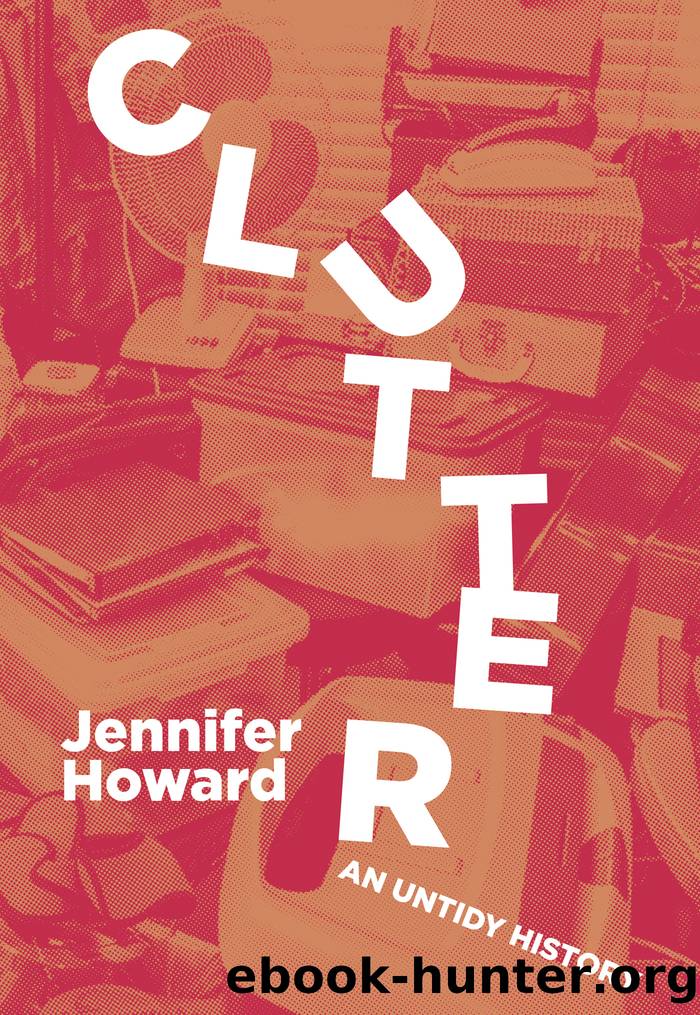Clutter: An Untidy History by Jennifer Howard

Author:Jennifer Howard [Howard, Jennifer]
Language: eng
Format: epub
ISBN: 9781953368096
Google: Wi9ZzgEACAAJ
Publisher: Belt Publishing
Published: 2022-01-04T23:20:47.370953+00:00
The Beecher sistersâ manual and Isabella Beetonâs blockbuster stand as two of the most famous examples of what was (and still is) a thriving market for domestic-economy books, though marketers wouldnât use the term today. The Schlesinger Library, part of the Radcliffe Institute for Advanced Study at Harvard University, maintains an extensive collection of 19th-century advice manuals. A search for âhousehold managementâ turns up 433 entries, including various editions of Mrs. Beetonâs book, but less-famous alternatives and competitors abound, published in both the UK and the United States.
I pulled together a few favorites, omitting some of the lengthy descriptive subtitles that spell out every subsection and category of domestic life covered in each book:
The complete home: an encyclopedia of domestic life and affairs, by Julia McNair Wright (1879)
First principles of household management and cookery: a textbook for schools and families, by Maria Parloa (1882)
Miss Corsonâs practical American cookery and household management, by Juliet Corson (c. 1885)
Mrs. Parkerâs complete housekeeper: a system of household management for all who wish to live well at a moderate cost, by Eliza R. Parker (1888)
The 19th- and early-20th-century popularity of such domestic advice books feels very contemporary. Over the decades, though, the âWaste-not, want-notâ ethos behind them got lost in the consumerist race to accumulate.
As historian Susan Strasser explains in Waste and Want, much of the early advice aimed at housekeepers focused on how to make the most use of limited resources. âWithout trash collectors or much cash for purchases, most nineteenth-century American women had to make do with whatever was at hand instead of solving problems with products,â she writes. âBooks of advice for farm women and urban housekeepers were full of ideas for using stored materials.â
Coal ashes, corncobs, even tea leaves could be put to good use. (Used tea leaves would âbrighten the looks of a carpet, and prevent dust.â) What would a 19th-century housewife make of contemporary clutter? The current emphasis on purging and discarding excess items would likely appall a reader of 19th-century advice manuals.
I see glimmers of hope in the recent popularity of the mantra âReduce, reuse, recycle.â Even though itâs deployed most often by relatively affluent and eco-conscious consumers, who have the means and time to put it into practice, it points the way to reclaiming the âWaste not, want notâ spirit that animated much of the counsel shared by Mrs. Beeton and her contemporary advice mavens. Yesterdayâs thriftiness has become todayâs sustainability.
Download
This site does not store any files on its server. We only index and link to content provided by other sites. Please contact the content providers to delete copyright contents if any and email us, we'll remove relevant links or contents immediately.
How to Be a Bawse: A Guide to Conquering Life by Lilly Singh(7488)
Spare by Prince Harry The Duke of Sussex(5199)
Millionaire: The Philanderer, Gambler, and Duelist Who Invented Modern Finance by Janet Gleeson(4481)
Machine Learning at Scale with H2O by Gregory Keys | David Whiting(4314)
Never by Ken Follett(3958)
Harry Potter 02 & The Chamber Of Secrets (Illustrated) by J.K. Rowling(3677)
The Heroin Diaries by Nikki Sixx(3552)
Urban Outlaw by Magnus Walker(3400)
Fairy Tale by Stephen King(3400)
Harry Potter and the Prisoner of Azkaban (Book 3) by J. K. Rowling(3360)
Japanese Design by Patricia J. Graham(3181)
The Man Who Died Twice by Richard Osman(3081)
The Club by A.L. Brooks(2926)
Will by Will Smith(2923)
Stacked Decks by The Rotenberg Collection(2883)
Harry Potter and the Deathly Hallows (7) by J.K. Rowling(2726)
Churchill by Paul Johnson(2587)
The Chimp Paradox by Peters Dr Steve(2387)
Borders by unknow(2318)
